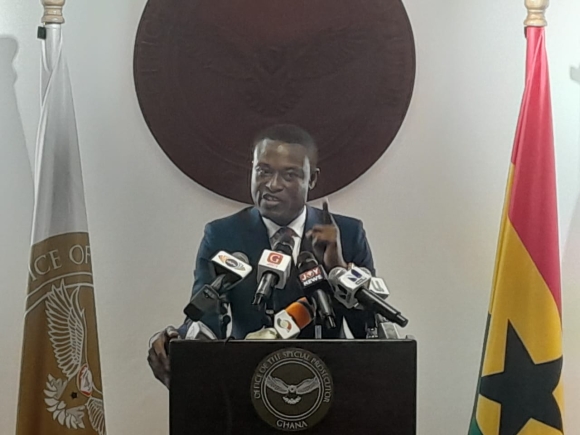
The Office of the Special Prosecutor (OSP) has commenced investigations into suspected corruption and corruption-related offences in government payroll systems.
The Special Prosecutor, Kissi Agyebeng, who announced this at a press conference in Accra yesterday, said the investigations were being done in collaboration with the Controller and Accountant General’s Department (CAGD).
Already, he said, a joint team of staff from the OSP and the CAGD had been formed to spearhead the investigations.
“The assessment and investigation are especially aimed at isolating and removing non-existent names, recovering wrongful payments, and the prosecution of persons suspected to be culpable for any offence(s),” he said.
“The investigation and assessment will cover all banks and employees on government payroll,” he added.
Mr Agyebeng said the investigations would be done in phases, with the first phase covering the Ghana Education Service (GES) and public health institutions.
The next phase, he said, would cover metropolitan, municipal and district assemblies (MMDAs), and ministries, departments and agencies.
State lands
The Special Prosecutor further announced that his outfit had commenced investigations into suspected corruption in transactions involving state lands, stool lands and other vested lands.
The scope of the investigations, he said, would involve the sale and lease of such lands from 1993 to date.
“The investigation covers all lands and properties that fall under the direct stewardship of the Lands Commission; the Ministry of Works and Housing; all other Ministries; State Housing Company; State-owned Companies; and other State agencies,” he said.
“The investigation also covers the management of vested lands and all public lands over which the State’s ownership or control has been relinquished and the conditions of release,” he added.
Criticism of judges
Mr Agyebeng, who was speaking at his first major engagement with the media since taking office two years ago, bemoaned what he described as a trend of “dismissive” attitude from some judges towards the work of the OSP which was hampering the fight against corruption.
He said the OSP, in compliance with its mandate, regularly updated the public on its operations, cases in court, as well as its opinion on judicial decisions affecting its work.
“Indeed, I have had several calls from well-meaning lawyers admonishing me that they have heard talk that our friends who have been elevated to the Bench and presiding over cases in court do not take very kindly to criticism, especially of the public-calling-out variety, and that if the Office persists in the media releases, the judges will gang up against the Office and throw out all our cases,” he said.
The Special Prosecutor said he personally did not believe judges “would ever adopt such a dystopian stance” as it would retard the fight against corruption.
However, he said recent judicial decisions relating to his outfit seemed to show a disturbing trend.
“There appears to be a developing trend of rather regressive and dismissive judicial decisions in respect of cases involving the OSP, with troubling consequences.
And it seems to us that a careful examination of these outcomes portends a disturbing spectre that the fight against corruption is being hampered to the disbenefit of us all,” he said.
He based his assertions on court decisions in four cases.
Although the Special Prosecutor did not mention the cases, the facts he gave referred to cases involving a former Presidential Staffer – Charles Bissue; a former Minister of Sanitation, Cecilia Dapaah; a former Commissioner of the Customs Division of the Ghana Revenue Authority (GRA), Col. Kwadwo Damoah; and a former CEO of the Forestry Commission, the late Kojo Owusu Afriyie, aka Sir John.
Comments on cases
On Sir John’s case, the Special Prosecutor said the decision by the court not to grant the freezing order on the late CEO’s property because he had died and had no interest in the properties was unfortunate.
“The danger of this outcome is obvious.
It is to the effect that a person may, in his lifetime, acquire property through corruption and then upon his demise happily pass on the corruptly acquired property to his estate,” he said.
With regard to the Charles Bissue case, he said the decision by the court to grant an injunction against his arrest meant criminal suspects could now run to court to avoid arrest.
“The judge did not avert his mind to the well-founded proposition that no one has the right not to be arrested,” he added.
Commenting on the Cecilia Dapaah case, Mr Agyebeng said the decision by the court, which he described as “hastily”, to refuse the confirmation of the seizure of her properties had the potential to scuttle the investigations by the OSP.
“The judge was only interested in a return of the money to the person of interest and nothing more and he proceeded to erect non-existent legal barriers to prevent the OSP from investigating the matter,” the Special Prosecutor added.
In respect of Col. Damoah’s case, the OSP said the decision by the court to prohibit the OSP from further investigating the customs officials meant the court had granted such persons immunity from investigations and prosecution, which were alien to the laws of the country.
Not asking for favours
The Special Prosecutor said his comments on the judicial decisions did not mean that he was asking for the OSP to be treated differently in the law courts or that every case involving the OSP should be ruled in its favour, irrespective of the evidence.
He said his comments also did not mean his outfit was infallible or beyond criticisms.
“However, it seems to us that the flagship public agency created by law to fight corruption should receive better regard and consideration by the courts and not the developing trend of dismissiveness and regression without regard to its governing enactments, and certainly not the erection of non-existent hurdles in its work and operations,” he added.
